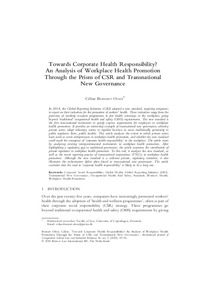Towards corporate health responsibility? An analysis of workplace health promotion through the prism of CSR and transnational new governance

The International Journal of Comparative Labour Law and Industrial Relations
2020
36
1
March
19-54
corporate social responsibility ; globalization ; occupational safety and health ; well being ; international law ; ILO ; WHO ; OECD ; code of conduct
Occupational safety and health
http://www.kluwerlawonline.com
English
Bibliogr.
"In 2018, the Global Reporting Initiative (GRI) adopted a new standard, requiring companies to report on their initiatives for the promotion of workers' health. These initiatives range from the provision of smoking cessation programmes to free health screenings in the workplace, going beyond ‘traditional' occupational health and safety (OHS) requirements. The new standard is the first transnational instrument to specify express requirements for employers in workplace health promotion. It provides an interesting example of transnational new governance, whereby private actors adopt voluntary norms to regulate business in areas traditionally pertaining to public regulators (here, public health). This article analyses the extent to which private actors have acted as norm entrepreneurs in workplace health promotion, and whether the new standard could mark the emergence of ‘corporate health responsibility' in the workplace. The article starts by analysing existing intergovernmental instruments in workplace health promotion. After highlighting a regulatory gap in traditional governance, the article examines the contribution of private regulators in workplace health promotion. To this end, it analyses the new standard, as well as the recent reporting practice of transnational corporations (TNCs) in workplace health promotion. Although the new standard is a welcome private, regulatory initiative, it also illustrates the orchestration deficit often found in transnational new governance. The article concludes that the road to ‘corporate health responsibility' is likely to be a long one."
Digital
The ETUI is co-funded by the European Union. Views and opinions expressed are however those of the author(s) only and do not necessarily reflect those of the European Union or the ETUI.